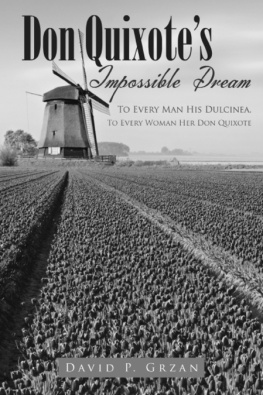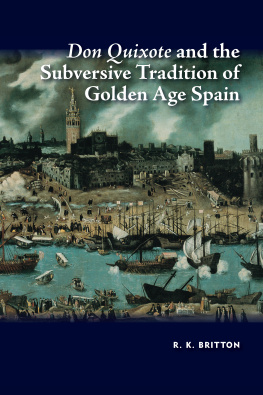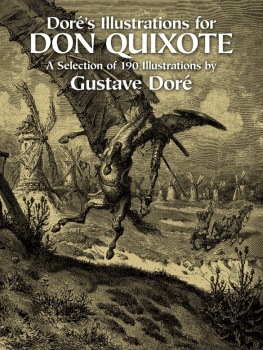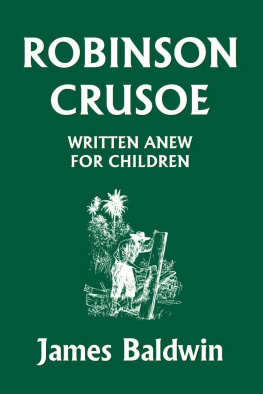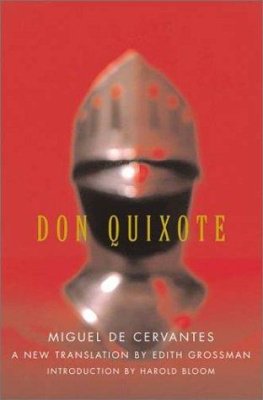OXFORD WORLDS CLASSICS
DON QUIXOTE
MIGUEL DE CERVANTES, who was born in 1547 and died in 1616, a few days after Shakespeare, had lived most of his life before he published the First Part of Don Quixote in 1605. He had served as a soldier in Philip IIs forces in the Mediterranean area, and been held captive for five years in North Africa. After his ransom and return to Spain, he was a minor government functionary, tax-collector, and aspiring dramatist. Don Quixote was an immediate success, and writing the sequel, composing, assembling, and publishing his other works, notably the Exemplary Novels (1613), kept him busy for the last decade of his life. His masterpiece combines powerful character-creation with pioneering narrative techniques. It remains the work to which the Western novel from the eighteenth to the twentieth century is most indebted.
The translation by Charles Jarvis, first published in 1742, has deservedly been one of the most successful and has often been reprinted.
E. C. RILEY is Emeritus Professor of Hispanic Studies at the University of Edinburgh.
OXFORD WORLDS CLASSICS
For over 100 years Oxford Worlds Classics have brought readers closer to the worlds great literature. Now with over 700 titlesfrom the 4,000-year-old myths of Mesopotamia to the twentieth centurys greatest novelsthe series makes available lesser-known as well as celebrated writing.
The pocket-sized hardbacks of the early years contained introductions by Virginia Woolf, T. S. Eliot, Graham Greene, and other literary figures which enriched the experience of reading. Today the series is recognized for its fine scholarship and reliability in texts that span world literature, drama and poetry, religion, philosophy and politics. Each edition includes perceptive commentary and essential background information to meet the changing needs of readers.
Refer to the to navigate through the material in this Oxford Worlds Classics ebook. Use the asterisks (*) throughout the text to access the hyperlinked Explanatory Notes.
OXFORD WORLDS CLASSICS

MIGUEL DE CERVANTES SAAVEDRA
Don Quixote de la Mancha

Translated by
CHARLES JARVIS
Edited with an Introduction and Notes by
E.C. RILEY


Great Clarendon Street, Oxford OX2 6DP
Oxford University Press is a department of the University of Oxford.
It furthers the Universitys objective of excellence in research, scholarship,
and education by publishing worldwide in
Oxford New York
Athens Auckland Bangkok Bogot Buenos Aires Calcutta
Cape Town Chennai Dar es Salaam Delhi Florence Hong Kong Istanbul
Karachi Kuala Lumpur Madrid Melbourne Mexico City Mumbai
Nairobi Paris So Paulo Singapore Taipei Tokyo Toronto Warsaw
with associated companies in Berlin Ibadan
Oxford is a registered trade mark of Oxford University Press
in the UK and in certain other countries
Published in the United States
by Oxford University Press Inc., New York
Editorial material E. C. Riley 1992
The moral rights of the author have been asserted
Database right Oxford University Press (maker)
First published as a Worlds Classics paperback 1992
Reissued as an Oxford Worlds Classics paperback 1998
Reissued 2008
All rights reserved. No part of this publication may be reproduced, stored in a retrieval system, or transmitted, in any form or by any means, without the prior permission in writing of Oxford University Press, or as expressly permitted by law, or under terms agreed with the appropriate reprographics rights organizations. Enquiries concerning reproduction outside the scope of the above should be sent to the Rights Department, Oxford University Press, at the address above
You must not circulate this book in any other binding or cover
and you must impose this same condition on any acquirer
British Library Cataloguing in Publication Data
Data available
Library of Congress Cataloging in Publication Data
Data available
ISBN 9780199537891
Typeset by RefineCatch Limited, Bungay, Suffolk
Printed in Great Britain by
Clays Ltd, St Ives plc
CONTENTS
INTRODUCTION
MIGUEL DE CERVANTES was 57 years old when the First Part of Don Quixote appeared in January, 1605. A rather marginal figure in literary circles, he was known at the time as the author of a number of plays, some occasional poems, and La Galatea, a pastoral romance. This last had been published twenty years before, was incomplete, and had only two editions to its name. Don Quixote, his belated first major success, was the product of most of a lifetime of experience and wide reading. His career as a young mansoldier, veteran of the Battle of Lepanto, captive for five years in North Africahad been adventurous and even heroic. The next twenty-five years, spent mostly as a minor government functionary and tax collector, were humdrum and unrewarding. His work took him travelling widely about Spain, however, and thus at least helped to lay some of the groundwork for Don Quixote.
It is not certain when he began to write the book, but he was busy with it by 1602. A remark in the first prologue suggests that he conceived the idea of it in prison (probably in Seville in 1597), although we cannot be altogether sure of this. In the summer of 1604 he negotiated the sale of the rights with the publisher and bookseller Francisco de Robles, and it went to the press of Juan de la Cuesta in Madrid. Success was immediate. There were five or six editions (two of them unauthorized) by the end of the year. As early as June 1605, the figure of Don Quixote was well-enough known to appear in a festival masquerade in Valladolid (where Cervantes was living at the time). In 1607 this happened again in Cuzco, Peru, in 1613 in Heidelberg, and at least ten times in all by 1621.
Cervantess new-found fame prompted a surge of writing, revising, and publishing, which continued for more than a decade until his death in 1616. Part Two appeared late in 1615too late to forestall a sequel written by someone who called himself the Licentiate Alonso Fernndez de Avellaneda. It is a crude work by comparison. The author, despite paying Cervantes the supreme compliment of imitating him, was hostile and even insulted him in the prologue. Cervantes, who was obviously offended, replied with acid restraint , and passim).
There had been nothing quite like Don Quixote before, although it had multiple points of contact with existing literature. The Spanish public took to it at once, for in the realm of prose fiction there was a ready reception for novelty and experiment. Viewed on a broad timescale, Don Quixote, for all its originality, may be regarded as the culmination of a century of experimenting with prose-fiction forms. The courtly sentimental romance Crcel de amor (Prison of Love) by Diego de San Pedro (1492), La Celestina, dialogue fiction of courtly amours and back-street life, by Fernando de Rojas (1499, 1502), Antonio de Guevaras pseudo-historical compilation, the Libro ureo de Marco Aurelio (1528, 1535known in contemporary England as
Next page


